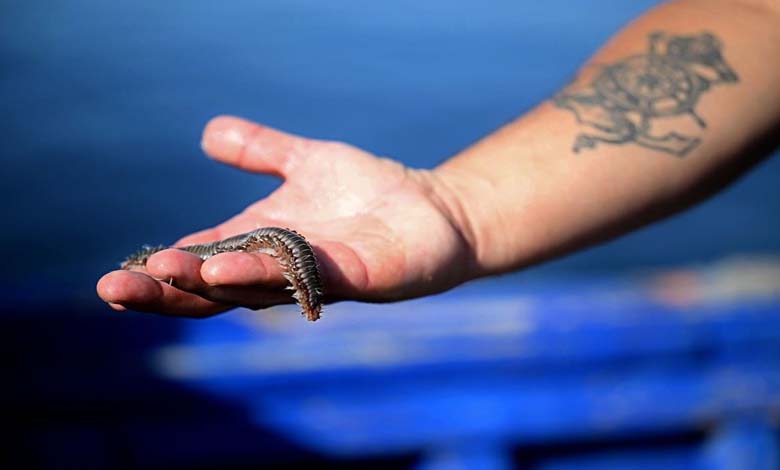Predatory worms devour “everything they encounter” in the Mediterranean

A type of predatory worm, whose numbers are increasing in the Mediterranean Sea with the rising water temperatures, is devouring parts of fish, a phenomenon that raises significant concerns.
-
The United Nations Warns of “Catastrophic Rise” in Temperatures
-
Record-Breaking Temperatures Hit North America in February
These worms, resembling centipedes, love to devour everything they encounter, from coral reefs to fish caught in nets, while the rising water temperatures due to climate change encourage their proliferation. The size of these worms ranges from 15 to 30 centimeters but can reach up to 50 centimeters.
These long, red worms wrap around the fish, and their white, venomous bristles detach upon contact, penetrating the skin and causing a sharp burning sensation. A fisherman told Agence France-Presse that he has been stung several times, including in the eye.
The worms attack fish as soon as they are caught in nets, devouring “the head, body, and removing their entrails,” explains the fisherman, while catching a deformed fish off the coast of Marzamemi village, a well-known tourist area in the southeastern tip of Sicily.
What is the Link to Climate Change?
The presence of this type of worm, scientifically named Hermodice carunculata, is not new in the Mediterranean, but their numbers were previously lower and only observed in Sicily during the summer.
-
Siberia: Temperature Rise Behind Appearance and Disappearance of Plant Species
-
Not recorded since 1884… Britain records unprecedented temperatures
The fisherman explains: “With global warming, water temperatures rise, creating an ideal habitat for these worms that multiply year after year and are now present all year round.”
Since fish cannot be sold if parts are eaten, fishermen have reduced the time nets stay in the water, resulting in fewer fish caught and limiting attacks by brown, green, or red worms.
According to the fisherman, these worms used to eat 30% of the catch, but now this number has risen to 70%.
-
Extreme heat drives Greek authorities to close the famous Acropolis Site
-
“Climate Tipping Point” threatens dangerous melting in Antarctica
Predators
The worms also migrate to new areas, and zoologist Francesco Tiralongo, who leads a project at the University of Catania in Sicily to study this phenomenon, has recorded cases in Calabria, in the far south of the country.
He told Agence France-Presse that this type of worm is “opportunistic, acting both as a predator and a scavenger,” noting “the enormous quantity present at limited depths.”
-
High pollution in the seine river threatens Paris Olympics
-
Heatwave Kills 52 People in India’s Capital in Two Days
On the beach of Marzamemi, worried tourists wear masks or plastic shoes before swimming.
The concerns of swimmers and the loss of fishermen’s incomes are not the only problems; invasive species expert Federico Betti indicates that “climate change is causing various changes in the Mediterranean, which are likely to worsen in the coming years.”
Finally, he notes that the average temperature in the Mediterranean has risen by about 1.2 degrees over the past forty years.












